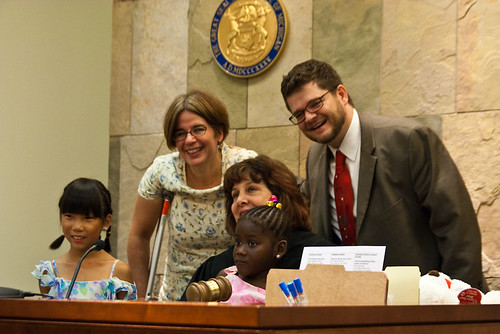In November 2013, Tyler Nelson and Pamela Nelson of Tampa, Florida, sat down for an interview with The World of Collaborative Practice Magazine. The Nelsons had decided to Divorce using the Collaborative Process, as they did not want to fight in Court and they wanted to focus on the best interests of their daughter. Tyler was joined by his collaborative attorney, Adam B. Cordover, and Pamela was joined by her attorney, Joryn Jenkins. The interview was conducted by carl Michael rossi.
You can find the full interview at The World of Collaborative Magazine, and you can find excerpts below.
Tyler: A child needs her mother and father, even if they’re not together…Pamela was the one who found out about the collaborative process and told me about it. You know, you’re always going to have some kind of fear. Is this going to work out like it should? What is everyone going to have to do to make this work out? But as soon as I spoke with Adam about everything, all of my fears were gone. He explained everything and the way it was going to work, how it was going to work. I’m pretty sure Pam felt the same way, as soon as she spoke to her lawyer, she probably went through everything. That’s the one good thing about our lawyers, that they explained everything that was going to happen before it happened.
Pamela: Not everybody knows about collaborative divorce, yet. We really didn’t know until it was explained to us. It was a better process for us, rather than go to court and fight.
Tyler: Everything that needed to be addressed, has been addressed…Everything that we wanted to agree on, we did, and everything that we wanted put down on paper, it was.
Pamela: We also have different visitation rights with our daughter. More than, likely, other people have. We already had that situated, and we just needed to put it on paper. It was kind of different than normal people, where they only see their kids every weekend. We do our schedule every week, and we split the holidays. We had to work that out, and put that on paper.
Pamela: The judge actually said that she agreed that we were doing it the best way and that we were dealing with the divorce in a good way. Instead of people fighting and it being a bad thing, it was actually a good situation.
Adam: It was interesting that, at the end of that final hearing, Tyler and Pamela had their pictures taken with the judge. It was described afterwards as being not so much like a divorce setting, but strangely enough kind of like a wedding setting. They had their picture taken with the officiating person. Judge Lee was fantastic and was praising Tyler and Pamela for dissolving their marriage in a way where they keep their focus on their children and not on fighting. To divorce in a way that
was in the best interest of their daughter.
Joryn: I can’t remember doing another divorce where the judge congratulated the parties afterwards, and I’ve been doing this for thirty years.
Tyler: (regarding an interdisciplinary team) They told me about the financial manager [Monicas Ospina, CPA], and she was great. So was the psychologist [Jennifer Mockler, Ph.D.], she was great. They were all great.
Pamela: [The financial professional and mental health professional] were very helpful. They helped us with our tax returns, to see who should file for dependency exemptions to get the most out of it. And the mental health professional helped us stay on the same page with our daughter to make sure that we were doing the right thing. The psychologist made sure we were on the same page in how we were raising our daughter and determine what’s best for her.
Pamela: (regarding the collaborative process) There’s no arguing, you know, there’s not really fighting or going back and forth or going to court or having the records be there out in public. There’s more privacy. I would definitely recommend it to anybody considering divorce.
Tyler: I have to agree with her…If you go and do the collaborative divorce, you have a lawyer there…They are not trying to make us fight. They are just there to write down what we want, and that’s the best thing about collaborative.
Tyler: We all sat down and talked. There was no arguing.
Pamela: The professionals worked around our schedules instead of us being court ordered to go to court on certain times and dates.
Pamela: (regarding going to the state-mandated parenting class) Everyone else was crying and hated their ex and wanted to kill them and I was like “well,
we’re friends, and everything is good.”
Tyler: “If anybody is thinking about doing a divorce, they should look into a collaborative divorce instead of jumping into it and going to court and fighting.”
Adam: “What I found excellent about this process and this couple, as opposed to the court-based divorces that I generally go through, is that when we were sitting around the table together with the mental health professional and financial professional, and we were talking, we weren’t just talking “civilly.” We were talking in earnest. We were actually just joking around at a few times and able to communicate in ways that you just couldn’t imagine doing in other divorce processes, even at a mediation table when there is the threat of litigation.
Joryn: “It is a much more protected environment, I think. It freed me up, and I’d like to think Adam, as well, to feel like we were teammates. We didn’t have to be adversaries, even though we were both representing different interests.”
Adam B. Cordover, Joryn Jenkins, Monica Ospina, and Jennifer Mockler are all members of Next Generation Divorce, formerly known as the Collaborative Divorce Institute of Tampa Bay. Next Generation Divorce is made up of professionals dedicated to respectfully resolving family disputes.






